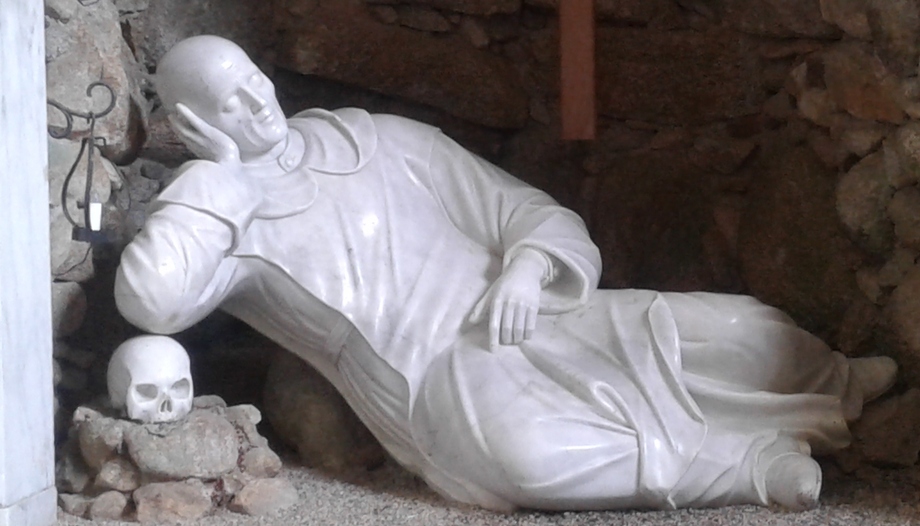On Sunday, October 9, 2011, Benedict XVI traveled to the Carthusian monastery of Serra San Bruno; his predecessor, St. John Paul II, had already been there on October 5, 1984. The name of this town belonging to the Italian province of Ancona, in the Marche region, comes from St. Bruno, who founded the monastery in 1091.
During his visit, Benedict XVI referred to the contemplative life: "Ecclesial communion needs an interior strength, that strength that Father Prior recalled a moment ago, quoting the expression 'captus ab Uno', referring to St. Bruno: 'held by the One', by God, 'Unus potens per omnia', as we sang in the hymn of Vespers. The ministry of pastors draws from contemplative communities a spiritual sap that comes from God". And further on: "This vocation, like every vocation, finds its response in a journey, in a search that lasts a lifetime".
St. Bruno and the sobriety of the Carthusians
St. Bruno founded the Carthusian Order, which is considered the strictest within the Catholic Church. The sobriety of the Carthusians is reflected not only in their lifestyle, but also in their liturgy, based on that elaborated by St. Bruno and his companions. This liturgy includes many times of silence and lacks musical instruments, although it incorporates Carthusian chant, similar to Gregorian chant but more austere.
On the official website "chartreux.org"After having directed for a long time the cathedral school of Reims, Master Bruno, 'a man of deep heart', responding to the divine call of an exclusive life for God alone, entered the Chartreuse massif in 1084 with six companions to revive in the West the spirit of the Desert Fathers. He then founded another monastery in Calabria, where he died in 1101". His death occurred on October 6, the date on which the Catholic Church celebrates his memory.
Birth of the Order
Bruno was born around the year 1030 in Cologne, in present-day Germany, and from a young age he stood out for both his intellect and his piety. He studied in Reims, where he later served as a teacher and respected canon. His struggle against simony, the purchase of ecclesiastical offices, marked him deeply, leading him to seek a life apart from ecclesiastical politics and material goods.
The Christian perfection he longed for was found, together with a group of companions, in a life fully dedicated to prayer and contemplation: in 1084, Bishop Hugo of Grenoble, a former student of Bruno, gave them an inhospitable and rocky piece of land in the French Alps. There they founded La Grande Chartreuse, the mother monastery of the Carthusian Order. This monastery became a model of monastic life centered on silence, prayer and manual labor.
The Carthusian monks live in almost absolute seclusion, spending most of their days in solitude, in their own cells, where they pray, meditate and do manual labor. Community meetings are rare and conversations are limited. Once a week they are allowed to talk during a community walk, and the rest of the time they communicate by sign language.
Papal court and last years of St. Bruno
However, Bruno was not able to fully enjoy his retreat for many years. In 1090, Pope Urban II, another former student of his, summoned him to Rome. Although he deeply desired to live in solitude, Bruno obeyed, but soon discovered that life at the papal court was not compatible with his ascetic spirit. He turned down the offer to be named archbishop of Reggio in Calabria, opting to return to the solitary life in an even more remote location, where he founded his second monastery in La Torre, Calabria.
He spent his last years in this hermitage, surrounded by lay people and clerics who shared his search for the perfect life in contemplation and silence. His death, on October 6, 1101, marked the end of a life dedicated to God, but also the beginning of a veneration that would last throughout the centuries.
Despite the austerity of his life, Bruno's influence was profound and lasting. His legacy spread rapidly through the Carthusian Order, which spread throughout Europe and reached its peak in the 16th century, with some 5,600 monks and nuns distributed in 198 monasteries.
Unlike other religious orders, the Carthusians did not seek the formal canonization of their founder for centuries. Only in 1514, under the papacy of Leo X, was Bruno's sanctity officially recognized by a papal decree confirming his veneration, without the need for the traditional canonization process. Later, in 1623, his feast was extended to the universal Church, thus consolidating his place in the history of Catholic spirituality.
The Carthusian Order today
Bruno's impact on Christian spirituality lies in his rejection of the temptations of power and wealth, and in his pursuit of a life dedicated exclusively to prayer and service to God. In an age marked by corruption and ambition for power within the Church, Bruno stood out for his purity of heart and integrity, qualities that inspired his contemporaries and continue to serve as a model for Carthusian monks today.
Today, the Carthusian Order continues to exist, with 23 Carthusian monasteries (18 of monks and 5 of nuns) around the world, where some 270 monks and 60 nuns follow the precepts of their founder. The Carthusians continue to live by the strict rules established by Bruno more than 900 years ago, maintaining the practice of silence, constant prayer and manual labor, and embracing the order's motto: "Stat crux dum volvitur orbis" ("The cross stands firm as the world turns"). A widespread motto holds that the Carthusian order has never been reformed because it has never been deformed ("Nunquam reformata, quia nunquam deformata").








